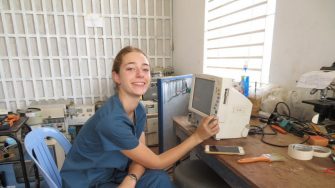- UNSW
- ...
- Humanitarian Engineering
- Global Impact Stories
- Repairing medical equipment in Cambodia
- Home
-
Vertically Integrated Projects
-
Explore VIP
- R2: Robo-re-Cycle
- Minex
- Space Power Systems
- 3D 4 Health
- 4D Immersive Surgery
- Mini Solar
- Biological Remediation
- Deep Earth Storage
- Fighting Fires with Science
- AI 4 Everyone
- Connected Health
- Mending broken hearts
- Assistive Tech Hub
- AUStronauts
- Purple House
- Flying Cars - Virtual Reality Simulator
- AtomCraft
- Sunswift Racing
- EASE – Exoskeleton for Assistive Support of Elderlies
- Sunswift Technology
- Student Information
- Benefits of Joining
-
Explore VIP
- Student Projects
-
Humanitarian Engineering
-
Global Impact Stories
- Solar freezer for remote Fijian communities
- Improving drought resistance in Uganda
- Measuring air quality in the South Pacific
- Repairing medical equipment in Uganda
- Brewing up world positive coffee
- Agricultural sustainability in Nepal
- Clean water for Sri Lankan communities
- Repairing medical equipment in Cambodia
- Building resilience to climate change in Tanzania
- Sustainable housing in Cambodia
- Empowering female entrepreneurs in India
- Making an impact in Myanmar
- Solar energy project helps remote Vanuatu villages
- Student Information
- Humanitarian Engineering Thesis Supervisors
-
Global Impact Stories
- Assistive Tech Hub
- Taste of Research
- Contact Us
- Home
-
Vertically Integrated Projects
Explore VIP
- R2: Robo-re-Cycle
- Minex
- Space Power Systems
- 3D 4 Health
- 4D Immersive Surgery
- Mini Solar
- Biological Remediation
- Deep Earth Storage
- Fighting Fires with Science
- AI 4 Everyone
- Connected Health
- Mending broken hearts
- Assistive Tech Hub
- AUStronauts
- Purple House
- Flying Cars - Virtual Reality Simulator
- AtomCraft
- Sunswift Racing
- EASE – Exoskeleton for Assistive Support of Elderlies
- Sunswift Technology
- Student Projects
-
Humanitarian Engineering
Global Impact Stories
- Solar freezer for remote Fijian communities
- Improving drought resistance in Uganda
- Measuring air quality in the South Pacific
- Repairing medical equipment in Uganda
- Brewing up world positive coffee
- Agricultural sustainability in Nepal
- Clean water for Sri Lankan communities
- Repairing medical equipment in Cambodia
- Building resilience to climate change in Tanzania
- Sustainable housing in Cambodia
- Empowering female entrepreneurs in India
- Making an impact in Myanmar
- Solar energy project helps remote Vanuatu villages
- Assistive Tech Hub
- Taste of Research
- Contact Us

Project summary
UNSW Engineering students travel to Cambodia with the Engineering World Health Summer Institute Program where they make an immediate impact by helping communities that need it most by repairing pieces of medical equipment in the local hospitals.
Project outcomes
Since 2016, about 150 students from UNSW have travelled to Cambodia repairing over 1,200 pieces of medical equipment!
On the most recent trip in 2020 they visited 14 hospitals, repairing 250 pieces of equipment valued at USD $500,000.
Notable projects included:
- fixing a universal power supply which allowed the hospital’s imaging division to begin working again
- converting a 40-year-old lamp from the Soviet Union to use LED bulbs
- returning the hospital’s largest autoclave, which is essential to hospital sanitation, back to working order.
Location
Phnom Pehn, Cambodia
Population of 1.5 million
12.5 hour journey from UNSW, Sydney
View on Google Maps, opens in a new window.
Project duration
2016 - on-going
United Nations Development Goals
SDG 3, opens in a new window - Good Health and Well-being
SDG 8, opens in a new window - Decent Work and Economic Growth
SDG 9, opens in a new window - Industry, Innovation and Infrastructure
SDG 10, opens in a new window - Reduced Inequality
SDG 11, opens in a new window - Sustainable Cities and Communities
SDG 17, opens in a new window - Partnerships for the Goals

